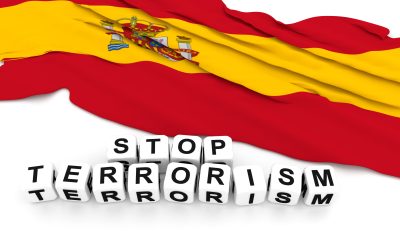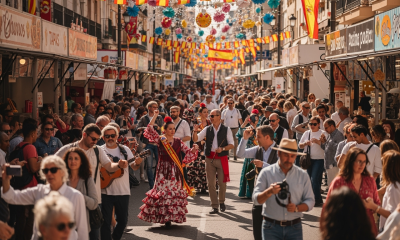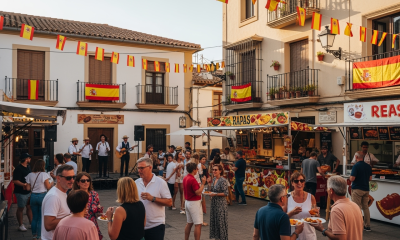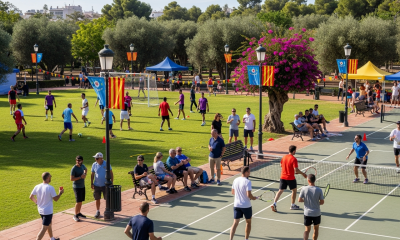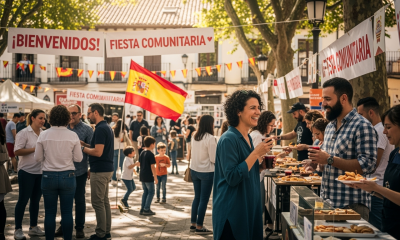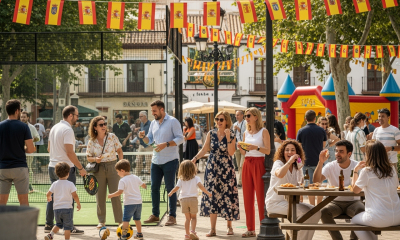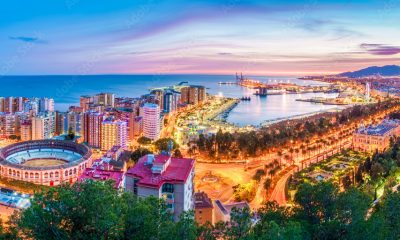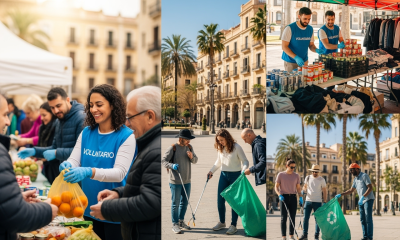Sport
A Golfer’s Paradise

Playing Golf in Spain
Spain, with its sun-drenched landscapes and diverse geography, is a golfer’s paradise.
From the rolling hills of Andalusia to the rugged coastlines of the Costa Brava, Spain offers an array of world-class golf courses that cater to players of all skill levels.
Combining the perfect climate with stunning scenery and exceptional hospitality, Spain is a top destination for golf enthusiasts from around the globe.
Here’s a closer look at what makes golfing in Spain so special, along with some of the best golf courses the country has to offer.
Why Spain is a Golfer’s Dream
- Ideal Climate:
Spain boasts over 300 days of sunshine annually, making it an ideal year-round golfing destination.
The mild winters in southern regions, like Andalusia, allow for uninterrupted play, while the warm summers in the northern areas offer perfect conditions for morning and evening rounds. - Scenic Beauty:
The Spanish landscape is incredibly varied, offering picturesque settings for golf courses.
Coastal courses provide stunning sea views, while inland courses feature rolling hills, olive groves, and lush greenery. - World-Class Facilities:
Spain is home to some of the best golf resorts in the world. Many courses offer state-of-the-art facilities, including luxurious clubhouses, professional-grade practice areas,
and expert coaching services. - Rich Culture and Cuisine:
After a round of golf, players can immerse themselves in the rich Spanish culture. From exploring historic cities and quaint villages to indulging in local cuisine and world-renowned wines, there’s plenty to enjoy off the course.
Top Golf Courses in Spain
1. Valderrama Golf Club (Andalusia)
Arguably the most famous golf course in Spain, Valderrama has hosted numerous prestigious tournaments, including the Ryder Cup in 1997.
Located in the exclusive region of Sotogrande, this Robert Trent Jones Sr.-designed course is renowned for its immaculate condition and challenging layout.
2. Real Club de Golf El Prat (Catalonia)
Situated near Barcelona, this course offers 45 holes of championship golf designed by the legendary Greg Norman.
The course is set within a stunning natural park and provides a challenging yet enjoyable experience for golfers of all levels.
3. La Manga Club (Murcia)
La Manga Club is a comprehensive golf resort featuring three superb courses: the North, South, and West courses.
Each offers a unique challenge, with the South Course being the most prestigious, having hosted numerous European Tour events.
4. PGA Catalunya Resort (Costa Brava)
Ranked among the top courses in Europe, PGA Catalunya boasts two exceptional courses: the Stadium Course and the Tour Course.
The Stadium Course, in particular, is known for its challenging layout and breathtaking views, making it a must-play for any serious golfer.
5. Finca Cortesin (Andalusia)
This modern gem, located near Marbella, has quickly gained a reputation as one of Spain’s best courses.
Designed by Cabell B. Robinson, Finca Cortesin offers a challenging and beautifully landscaped course that has hosted the Volvo World Match Play Championship.
6. Real Club Valderrama (Costa del Sol)
Another jewel on the Costa del Sol, Real Club Valderrama, is a favorite among professional and amateur golfers alike.
The course is meticulously maintained and features a variety of challenging holes set amidst cork oak trees and rolling terrain.
7. Las Colinas Golf & Country Club (Alicante)
Nestled in a secluded valley, Las Colinas offers a peaceful and scenic golfing experience.
The course, designed by Cabell B. Robinson, features wide fairways, strategic bunkering, and beautiful water hazards, making it a delightful challenge for golfers.
Tips for Golfing in Spain
- Book in Advance:
Popular courses and resorts can get booked up, especially during peak seasons. It’s advisable to book your tee times and accommodations well in advance. - Stay Hydrated:
The Spanish sun can be intense, particularly in the summer months. Make sure to stay hydrated and wear sunscreen to protect yourself from the sun’s rays. - Embrace the Siesta:
Many courses and clubhouses observe the traditional Spanish siesta, so plan your rounds and meals accordingly. - Explore Beyond the Greens:
Take time to explore the local culture, cuisine, and attractions. Visiting nearby cities, enjoying local wines, and indulging in Spanish tapas,
can enhance your golfing holiday experience.
Conclusion
Golfing in Spain offers an unforgettable experience with its perfect climate, stunning landscapes, and world-class facilities.
Whether you’re a seasoned pro or a casual player, Spain’s diverse golf courses provide the perfect setting for an exceptional golfing adventure.
From the legendary Valderrama to the serene Las Colinas, Spain’s golf courses are sure to delight and challenge golfers of all levels.
So pack your clubs and get ready to tee off in one of Europe’s premier golfing destinations.
Cultural
Get active with sports teams: a guide for expats in Spain

Published: August 2025
Getting involved in sports is one of the fastest and most enjoyable ways to integrate into Spanish life. Whether you’re a passionate football fan, a tennis enthusiast, or just want to stay fit and meet friends, Spain’s sports scene is vibrant, welcoming, and open to all. Joining a local team or club not only improves your health but also helps you build a social network and learn the language in a natural setting. Here’s how expats can get active with sports teams in Spain.
Why sports are so important in Spain
Spain is famous for its love of sports. From world-class football and basketball to padel, cycling, and running, there’s something for everyone. Sports bring people together, break down language barriers, and offer a fun way to experience Spanish culture. Many expats find their first local friends through shared training sessions, matches, or tournaments.
Popular sports and how to join
- Football (soccer): Nearly every town has local teams for all ages and levels. Check your municipal sports center.
- Padel and tennis: Spain is a global leader in padel. Most cities have public and private courts, with clubs offering lessons and social tournaments.
- Basketball: Many towns have amateur teams and leagues. Great for all ages and skill levels.
- Running and cycling: Join local clubs for group runs, bike rides, and races. Try Meetup.com for running groups.
- Swimming, yoga, fitness: Most municipal sports centers offer classes, open gyms, and pools.
How to join a team or club
- Check your local town hall’s website or visit the nearest sports center for a list of teams and clubs.
- Ask about open training sessions—many clubs let you try before committing.
- Bring your ID (passport/NIE) and be ready to fill out a short registration form.
- Most clubs charge a small monthly or annual fee. Equipment can usually be rented or borrowed at first.
- Don’t worry if your Spanish isn’t perfect—sports are a universal language!
Benefits of joining sports teams as an expat
- Meet locals and other expats in a relaxed, social environment
- Stay healthy and active all year round
- Improve your Spanish through real-life conversations
- Participate in tournaments, social events, and trips
- Get insider tips on local life and culture
Useful links
Do I need to speak Spanish to join a sports team? No, many clubs are used to welcoming expats and will help you learn as you go. How much does it cost to join a sports club? Fees are usually affordable (€10–€40/month), and many clubs offer free trial sessions. Can I join as a complete beginner? Absolutely! Most clubs have teams for all levels, and coaches are happy to help newcomers. Are there sports clubs for children and families? Yes, most towns offer youth leagues and family-friendly activities. What equipment do I need? Basic gear is often provided or can be borrowed until you decide to buy your own. How do I find out about local matches and events? Check club websites, local notice boards, or ask your teammates for info. Can I join more than one club? Yes, many expats join several clubs to try different sports and meet more people. Are there women-only or mixed teams? Both options are widely available—ask at your local sports center for details. How do I stay motivated to keep active? Set goals, join group challenges, and make it social—having friends on your team helps! Is it easy to make friends through sports? Yes, shared activities and teamwork make it one of the best ways to build a social network in Spain.
Disclaimer: This article is for informational purposes only. Always check with clubs or sports centers for the latest schedules and requirements.
Cultural
Join local clubs and associations: the key to integrating in Spain

Published: August 2025
One of the best ways to feel at home in Spain is to join local clubs and associations. Whether you’re passionate about sports, arts, volunteering, or simply want to meet new people, Spain offers an incredible variety of groups where expats and locals mix. Getting involved in clubs not only helps you build a social network, but also fast-tracks your language skills, cultural understanding, and sense of belonging. Here’s how you can make the most of Spain’s vibrant club scene.
Why clubs and associations matter for expats
Clubs are the heart of Spanish community life. From football and cycling to chess, hiking, art, and gastronomy, there’s a club for almost every interest. Joining a club is an easy way to meet people who share your passions, get insider tips on local life, and take part in events you might otherwise miss. Many expats find their first Spanish friends through these groups.
How to find the right club for you
- Check your local town hall (Ayuntamiento de Málaga) for a list of registered clubs and associations.
- Use Meetup.com to find international and local groups in your area.
- Look for flyers in community centers, libraries, and cafés—many small clubs still advertise offline.
- Ask neighbors, colleagues, or other expats for recommendations.
Popular types of clubs in Spain
- Sports clubs: Football, tennis, padel, running, cycling, basketball, yoga, and more.
- Hobby and interest groups: Photography, painting, chess, language exchange, cooking, book clubs.
- Volunteering associations: Animal rescue, environmental projects, social aid, Red Cross (Cruz Roja).
- Professional and networking groups: Young entrepreneurs, women in business, tech meetups.
- International clubs: Many cities have “International Friends” or “Expats in [City]” groups.
How to join and get involved
- Contact the club via their website, social media, or by attending an open event.
- Most clubs are happy to welcome newcomers—don’t worry if your Spanish isn’t perfect!
- Attend a few meetings or activities to see if the group is a good fit for you.
- Offer to help out or volunteer for events; you’ll make friends faster and feel more included.
Benefits of joining clubs and associations
- Meet locals and other expats with shared interests
- Practice Spanish in a relaxed, real-life setting
- Access to exclusive events, workshops, and trips
- Get insider tips on living in Spain
- Feel part of the community and reduce homesickness
Useful links
- Meetup.com – find groups in Spain
- Cruz Roja Española (Red Cross Spain)
- Ayuntamiento de Málaga – local clubs
- Expats in Spain Facebook group
Do I need to speak Spanish to join a club? No, many clubs welcome English speakers and are used to helping newcomers. Joining is a great way to improve your Spanish. How much does it cost to join a club? Most clubs charge a small annual fee (€20–€100), but many events are free or pay-as-you-go. Can I join more than one club? Absolutely! Many expats join several clubs to explore different interests and meet more people. Are there clubs for families and children? Yes, there are sports teams, music groups, and cultural associations for all ages. How do I find out about club events? Follow your club on social media, check their website, or sign up for newsletters. Is volunteering a good way to meet people? Yes, volunteering is a fantastic way to make friends and contribute to your community. What if I’m nervous about joining alone? Most newcomers feel the same way—clubs are used to welcoming people who come alone. Can I create my own club if I don’t find what I’m looking for? Yes, it’s easy to start a new group—use Meetup.com or Facebook to invite others. Are there online-only clubs? Yes, many hobby and language groups meet online or combine online and in-person events. How do I stay updated about new clubs in my area? Check your town hall’s website, local notice boards, and expat forums regularly.
Disclaimer: This article is for informational purposes only. Always check club websites or contact organizers for the most up-to-date information.
Cultural
Why social life matters for expats in Spain

Published: August 2025
Moving to Spain is about more than just finding a home or a job – it’s about building a life. For expats, developing a social network is one of the most important (and rewarding) parts of settling in. A strong social life helps you integrate, improves your well-being, and opens doors to opportunities you might never have found otherwise. In this article, we explore why social life matters so much for expats in Spain, and how you can make the most of it.
The importance of connection
Research shows that expats with an active social life adapt faster and feel happier in their new country. In Spain, where community is woven into daily life, having friends and connections is essential for everything from navigating bureaucracy to enjoying local traditions. Social ties help you:
- Learn the language faster through real conversations
- Find support with paperwork, housing, and job hunting
- Discover hidden gems and local experiences
- Feel less isolated and more at home
Integration and mental health
Loneliness is a common challenge for new arrivals. Studies from InterNations and Expatica show that expats who actively build social circles experience lower stress and adapt more easily. In Spain, joining community events, sports clubs, or language exchanges can be a lifeline for mental health and well-being.
Building your network: where to start
Spain offers endless opportunities to meet people. Some of the best ways to start building your social network include:
- Joining local clubs and sports teams (check your town hall or Meetup.com)
- Attending language exchanges or international meetups
- Volunteering for local charities or community projects
- Participating in festivals and neighborhood events (Spain’s official event calendar)
- Connecting with expat groups on Facebook or WhatsApp
How social life helps you succeed as an expat
A strong social network isn’t just about friendship – it’s a practical tool. Friends can recommend trusted professionals, help with job leads, and guide you through Spanish customs. Many expats find their first job, apartment, or even business partner through social connections rather than formal channels.
Overcoming barriers
It’s normal to feel shy or out of place at first. Remember, most Spaniards appreciate when foreigners make an effort. Don’t be afraid to join in, ask questions, or invite someone for coffee. The more you participate, the easier it becomes.
Useful resources
- Meetup.com – find events in Spain
- InterNations Spain
- Spain’s official event calendar
- Expats in Spain Facebook group
- New in Spain – community guides
How can I meet people in Spain if I don’t speak Spanish? Start with international meetups, language exchanges, and expat groups – many events are bilingual or in English. Is it hard to make friends as an adult expat in Spain? It takes effort, but joining clubs, volunteering, and saying yes to invitations makes it much easier. Are there clubs for specific hobbies or sports? Yes, Spain has clubs for everything from hiking to photography and chess. Check local listings or Meetup.com. How do I find out about local events? Town hall websites, Facebook groups, and Spain’s official event calendar are great sources. Can a social network help with practical issues like paperwork? Absolutely – friends and local contacts are often the best source of advice and support for bureaucracy. Is it normal to feel lonely at first? Yes, many expats feel isolated initially. Getting involved in groups and events helps a lot. What if I’m introverted? Try smaller group activities or volunteering, where it’s easier to connect one-on-one. Are there online communities for expats in Spain? Yes, Facebook, WhatsApp, and forums like Expatica have active expat communities. How important is food in Spanish social life? Very important – sharing meals is a key way to build friendships and be included. What’s the biggest benefit of having a social life in Spain? Feeling at home, getting support, and making the most of your experience in Spain.
Disclaimer: This article is for informational purposes only and based on expat experiences. Your journey may vary, but building a social life in Spain is always worth the effort.













